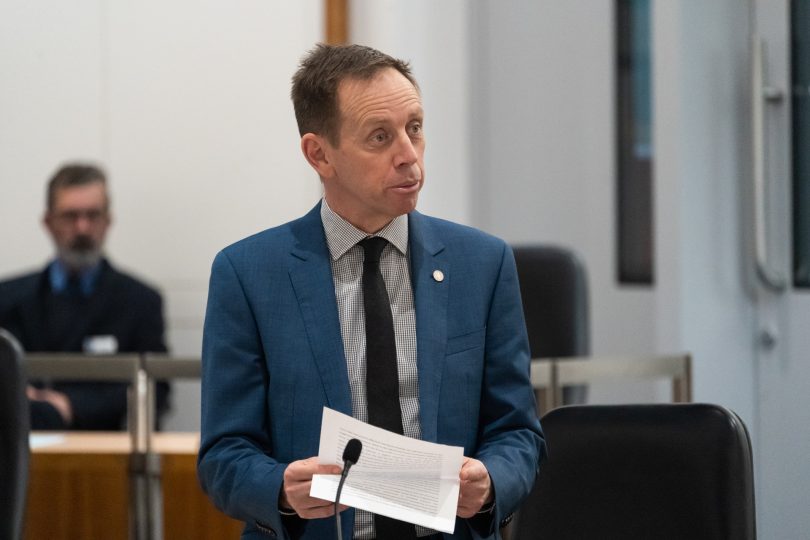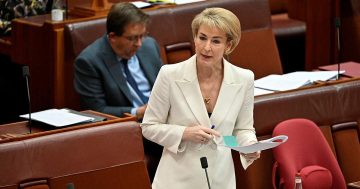
Attorney-General Shane Rattenbury is calling on his interstate counterparts to support the ACT’s right to legislate on assisted dying. Photo: Dominic Giannini.
The ACT and Northern Territory have been unable to secure the support of the states for the right to legislate on voluntary assisted dying, but they remain undeterred.
ACT Attorney-General Shane Rattenbury and his NT counterpart Selena Uibo used Friday’s (12 November) Meeting of Attorneys-General (MAG) to ask all state Attorneys-General to support territory rights.
However, Mr Rattenbury said they left the meeting without being able to reach a resolution with the states and had found the Federal Government remained resolute in its refusal to support the change.
Since 1997 when the Commonwealth passed the Euthanasia Laws Act (also known as the Andrews bill), both territories have been prevented from passing legislation concerning euthanasia or voluntary assisted dying.
Yet since 2017, every state apart from NSW – which has introduced a Bill into its parliament – has legislated for voluntary assisted dying.
In NSW, the debate on voluntary assisted dying laws began last Friday (12 November).
Speaking after Friday’s MAG, Mr Rattenbury said he and Ms Uibo had put forward a strong case, and they would continue to pursue the issue with all states in the coming weeks.
He’s described the current situation as “untenable”, as well as “unfair and undemocratic”, and has committed to continuing to build pressure in the Federal Parliament.
“This law will eventually change,” he said.
Mr Rattenbury also says the inability to legislate on voluntary assisted dying has allowed residents of the territories to be treated as second-class citizens.
“The imposed restriction on our ability to legislate on voluntary assisted dying is inequitable and undemocratic,” Mr Rattenbury said.
“Voluntary assisted dying is a deeply important issue to people in the ACT, and we should be permitted to consider this issue within our own democratically elected parliament.”

Earlier this year, Human Rights Minister Tara Cheyne wrote to the federal government to outline her concerns with the current situation and slammed the response the ACT received. Photo: Dominic Giannini.
On a local level, there is tripartisan support for the ACT to have the ability to legislate on voluntary assisted dying.
Only last month, federal Attorney-General Michaelia Cash confirmed the Commonwealth Government has no plans to introduce legislation to repeal the Euthanasia Laws Act as she responded to a letter outlining the concerns of ACT Human Rights Minister Tara Cheyne and Ms Uibo, which was sent to former federal Attorney-General Christian Porter earlier this year.
The ACT Legislative Assembly passed unopposed a motion denouncing the response and criticising the fact the ACT had been left out of a bill raised by outgoing NT Senator Sam McMahon, which called on the federal government to reinstate the right to legislate on the issue in the NT.
The ACT had been left out after Senator Zed Seselja indicated he wouldn’t support it, according to Senator McMahon at the time.
Last week, however, Senator Seselja argued the resolution, which the Assembly had adopted, contained “serious inaccuracies and falsehoods” by suggesting he had deliberately blocked an attempt to reinstate territory rights.
Ms Cheyne and Mr Rattenbury’s motion said the ACT had been left off Senator McMahon’s bill at the “explicit request” of Senator Seselja.
Senator Seselja said a letter written to Senator Katy Gallagher from Senator McMahon in which she said the decision to leave the ACT out of her bill had been made of her own accord had been public knowledge and, therefore, the MLA code of conduct had been breached.
Opposition whip Jeremy Hanson failed to pass a motion calling on Ms Cheyne and Mr Rattenbury to write to all federal senators and members of the Assembly to apologise for misleading them.
Ms Cheyne dismissed the motion as an argument about semantics while Mr Rattenbury said the English language could be “flexible”.

















